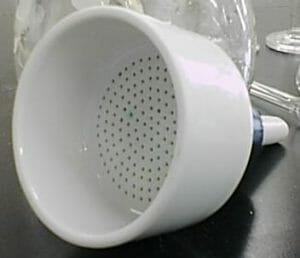Filtration Definition
Filtration is the separating of substances based on their different physical and chemical qualities. Typically, we think of it as the removal of solid particles from a mixture containing both solids and liquids. In this process, we refer to the collected solid material as the residue and the fluid material as the filtrate. Usually, a tool that contains some form of pores is used, which allows the fluid portion, but not the solid portion, to pass through. Different materials are used for the purpose of filtration, including paper, sand, and cloth. Filtration also occurs naturally in our bodies, for example in the kidneys, where the blood is filtered in a process called glomerular filtration.
Types of Filtration
There are many different ways to filter matter, and below are just a few that we can use in the separating of substances.
Vacuum Filtration
In vacuum filtration, a vacuum pump is used to rapidly draw the fluid through a filter. Hirsch funnels and Buchner funnels, which are the same kind of funnel in two different sizes, are used along with filter paper. The funnels have a plate with holes in it, as we can see below, and they are usually used when the substance to be filtered is small in volume.

Centrifugal Filtration
This kind of filtration is done by rotating the substance to be filtered at very high speed. Due to the horizontal rotation, the more dense matter is separated from the less dense matter.
Gravity Filtration
This is where the mixture is poured from a higher point to a lower one. It is commonly done through simple filtration, using filter paper in a glass funnel, where the insoluble solid particles are captured by the filter paper and the liquid goes right through by gravity’s pull. Depending on the volume of the substance at hand, filter cones, fluted filters, or filtering pipets can be used.
Cold Filtration
Cold filtration makes use of very low temperatures, often by using an ice bath. Some substances, such as fatty acid particles, become suspended in the mixture as they cool down, which then allows us to filter them out more easily.
Hot Filtration
This is often used for crystalline compounds that contain impurities. The way this filtration is done is by melting down the crystalline compound, removing the impurities as the substance is still in liquid form, and finally recrystallizing the now pure substance. Often, it is recommended that the apparatus used in this filtration be heated up so that the filtered substance doesn’t crystallize in the funnel and block the flow.
Multilayer Filtration
This can refer to multiple layers of different material, including sand, gravel, or charcoal, where the different layers contain different particle sizes of that material. In this type of filtration, a mixture of liquid and insoluble solid particles is poured over the layers, and the solid particles are caught throughout, resulting in a filtered liquid.
Functions of Filtration
Filtration has many different uses, such as the cleaning of water, like river water, from impurities. It can also be used for sterilization without the use of heat, as long as the filter’s pores are small enough to catch the microorganisms. Keep in mind that this process will not kill the microorganisms since it does not make use of heat.
Related Biology Terms
- Diffusion – The arbitrary spreading of particles from a region where they are at a higher concentration to another where they are at a lower concentration.
- Osmosis – The motion of a solvent through a partially permeable membrane from a region where it is at a higher concentration to where it is at a lower concentration.
- Viscosity – The extent to which a fluid resists flow.
Quiz
1. We refer to the liquid that has had solids filtered out of it as the:
A. Filter
B. Filtrate
C. Residue
D. Funnel
2. Which of the following must centrifugal filtration involve?
A. High temperatures
B. Low temperatures
C. Rotation
D. Charcoal
3. Where does glomerular filtration occur in the human body?
A. Kidneys
B. Eyes
C. Heart
D. Stomach
